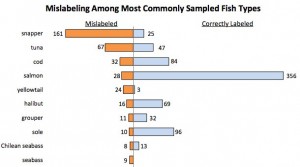Questionable Labeling of Seafood
 If you saw our previous article on sushi restaurants, grocery stores and venues mislabeling their seafood, you know that it is a rampant problem in the sushi industry. How bad is it? In restaurants tested, almost three quarters were selling mislabeled fish. If you are paying for premium quality fish, you need to know you are getting what you ask for. And it isn’t just about the money. Mislabeling poses even greater risks for pregnant women looking to avoid mercury. Cheaper fish such as Tilefish, often misleadingly labelled as Grouper and Halibut, has a mercury content high enough that the FDA warns small children, nursing mothers and pregnant women to stay away from it. Sushi is safe when you know exactly what you are getting and how it is prepared, but when high percentages of restaurants, stores and markets are selling mislabeled fish, it is difficult for consumers to trust retailers. How can you be certain your sushi has been prepared safely if you can’t even be certain it’s the right fish?
If you saw our previous article on sushi restaurants, grocery stores and venues mislabeling their seafood, you know that it is a rampant problem in the sushi industry. How bad is it? In restaurants tested, almost three quarters were selling mislabeled fish. If you are paying for premium quality fish, you need to know you are getting what you ask for. And it isn’t just about the money. Mislabeling poses even greater risks for pregnant women looking to avoid mercury. Cheaper fish such as Tilefish, often misleadingly labelled as Grouper and Halibut, has a mercury content high enough that the FDA warns small children, nursing mothers and pregnant women to stay away from it. Sushi is safe when you know exactly what you are getting and how it is prepared, but when high percentages of restaurants, stores and markets are selling mislabeled fish, it is difficult for consumers to trust retailers. How can you be certain your sushi has been prepared safely if you can’t even be certain it’s the right fish?
Finally, a lawmaker is paying attention to this. On Monday, April 7, California Senator Alex Padilla held a press conference in Sacramento on his new bill which will impose criminal penalties on those found guilty of mislabeling seafood. The bill, Bill SB 1138 is set for a hearing on April 9th by the Senate Health Committee and would “require any label of fresh, frozen, or processed fish or shellfish, wild or farm raised, offered for sale at wholesale or retail to clearly identify the species of fish or shellfish by its common name, as specified.”
Helping Consumers With Common Named For Seafood
What exactly is a common name? Common names vary from region to region. They are the names of fish which are regionally used to designate species, which means that while common names are sometimes inappropriate for interstate commerce, they are the best way for local consumers to know they are getting what they paid for. That is why SB 1138 will create and impose a state-mandated local program to enforce existing law, which is clarified in the text of the new bill.
Currently, while it is a crime to mislabel food, laws are ambiguous or murky in the area of seafood, allowing retailers to mislabel food with seeming impunity considering the rampant levels of mislabeling. The FDA attempts to regulate the seafood industry, but the task seems to be of a magnitude too great for them to stop the current surge of mislabeling, which is why state-mandated local programs could be the answer, backed by the authority to levy criminal penalties and fines. Before this bill, guidelines for labeling fish were generally under the FDA “fish list“, which supports the labeling of seafood by the common name but did not mandate it, saying only that “FDA generally regards common names as appropriate market names, provided they are not misleading or confusing”. It’s obvious by the current rate of mislabeling that it isn’t enough, and that the enforcement right now just isn’t there.
A bill like this does so much more than protect consumers wallets. This bill could protect new mothers, pregnant women and small children from the dangers of mercury poisoning. It could protect those with allergies from serious reactions. And on the conservation front, this bill is one step forward for ecological sustainability efforts which are impeded by mislabeling of seafood. Consumers who are trying their best to eat only sustainable seafood may find themselves, through no fault of their own, eating at-risk species mislabeled as sustainably best choices. We will be following the course of this bill closely, and sushi lovers and consumer rights advocates should too. Consumers have the right to know exactly what they are putting in their bodies, especially when you are talking about raw fish.
I have always been fascinated by the creation and culture of different foods, particularly sushi and sashimi in the modern era of Japanese cuisine. I am a classically trained chef and sushi connoisseur, also having operated a food service company and enjoy investigating and experimenting with food around the world.
